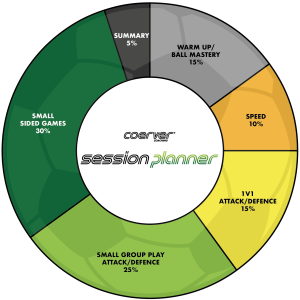How to plan sessions
Session Planning
Knowing what you want to practice is critical to getting the most out of your training sessions, but it’s also one of the most daunting things to a new coach: some feel there are too many exercises to choose from, while others will remember only the exercises they did in training as a player.
The way that we construct our sessions at Coerver Coaching is following our Coerver Coaching Session Planner. For more information on this go here.
We've put together a few tips to help you out:

Preparation
Aim to layout your field before the session starts. Check that there are no dangerous objects on the pitch, and that the goals are secure.
Selecting the drills and games for your session
Each week select drills and games that helps players to practice their passing and receiving, and their attacking and defending skills. Make sure the drills are appropriate for the age and ability of your players, choosing drills that are fun is especially important for the younger players. If the drill can be turned into a competition between the players and groups (such as relay races featuring different skills), then players will be more engaged, focused, and appreciate the importance of speed in the game. Finally, make sure that at least 30% of your session is small-sided games where you do very little coaching, save it for at the end and give them one or two tips that will help them next time.
Progression is king
Select drills and games that have harder variations. Gradually increasing the difficulty helps the players improve and perfect their skills whilst not overloading them. Choose a skill, say passing, then chose a 3 part drill: Part one: repetition of the passing Skill Part two: increase the difficulty, for example one touch passing or quicker passing Part three: add an opponent that is trying to win the ball as the passing takes place.
Time it right
Time is limited in your sessions, so consider how long you will devote to each exercise. When planning your session consider setting up time, actual practice time and packing up time. Think about how many drills and games you want to be doing – as a guide, between three and four is probably about right, make sure at least 30% of your session is for small-sided games, mostly free from any coaching.
Do's and don’ts
Try to keep your communication simple, short, and clear. Be encouraging and be positive, praise hard work. Avoid being critical of players performance. Don’t interrupt the practice too frequently, keep it flowing unless the players do not understand the drill or for any safety concerns. Finally, don’t over-coach!
Please see our Terms of Use and Privacy Policy.